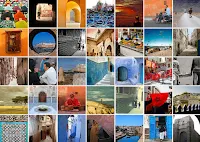20 Facts About Morocco
Morocco Facts. People, geography and culture of Morocco make this African country one of the most traveled countries in the world.
Morocco is slightly more than three times the size of New York or slightly larger than California.
Steeped in history, mystery, and beauty, here are twenty interesting facts about the 57th largest country in the world, Morocco. |
| Friends in Tangier Tetouan Morocco photo by Hernán Piñera |
20 True Facts About Morocco
Independence from France on March 2, 1956The English name Morocco derives from, respectively, the Spanish and Portuguese names Marruecos and Marrocos, which stem from Marrakesh the Latin name for the former capital of ancient Morocco; the Arabic name Al Maghrib translates as The West.
Morocco’s’ population is around 33,322,699 (July 2015 est.)
Morocco is the most westerly of the North African countries known as the Maghreb or the Arab West.
The capital city of Morocco is Rabat, although the largest city is Casablanca with nearly 4 million people.
Citizenship in Morocco is by descent only: the father must be a citizen of Morocco; if the father is unknown or stateless, the mother must be a citizen.
Languages Arabic (official), Berber languages - Tamazight (official), Tachelhit, Tarifit, French is often the language of business, government, and diplomacy.
From 1975-76 Morocco annexed Western Sahara but faces an ongoing guerrilla battle for independence from local Saharawi people to this very day despite a UN ceasefire agreement.
The English name "Morocco" derives from, respectively, the Spanish and Portuguese names "Marruecos" and "Marrocos," which stem from "Marrakesh" the Latin name for the former capital of ancient Morocco; the Arabic name "Al Maghrib" translates as "The West"
 |
| Morocco in pictures |
Since Spain's 1976 withdrawal from what is today called Western Sahara, Morocco has extended its de facto administrative control to roughly 80% of this territory; however, the UN does not recognize Morocco as the administering power for Western Sahara.
Morocco is slightly more than three times the size of New York or slightly larger than California.
Morocco is mountainous with the Atlas Mountains running from northeast to the southwest through the center and the Rif Mountains located in the north.
Chefchaouen is the beautiful world famous electric blue city of Morocco.
Morocco is the only African nation to have both Atlantic and Mediterranean coastlines.
Morocco’s’ national symbols are the pentacle symbol, lion; national colors: red, green.
Morocco is one of the world's largest producers of illicit hashish.
Moroccan cities generally have mosques, market areas called bazaars, old medieval sections called medinas and old fortresses called kasbahs.
Green tea with mint and sweetened with sugar is a popular beverage in Morocco.
The most famous of Moroccan dishes is couscous.
The Moroccan national team became the first African and Arab country to make to the second round of a World Cup when they did so in 1986.




